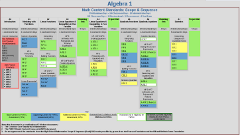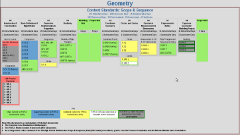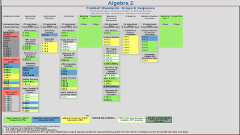Click or Select any of the tabs below for more information...
Math Awards - Student Title-holders
EHS has two math student awards offered to 2 students every year.
The Jack Elam Outstanding Math Team Student AwardJack Elam was the first EHS math department chair and a founding faculty member of the EHS Math Team. This award is given in his honor to the student who best demonstrates outstanding ability, effort, and attitude while participating and promoting excellence on the EHS Math Team |
The EHS Outstanding Senior in Mathematics AwardThe EHS Outstanding Senior in Mathematics award is given to the graduating senior who has demonstrated outstanding math ability in his/her math courses during 4 years at EHS and has encouraged and promoted mathematics both in the classroom as well as in extra-curricular activities
|
|
|
|
Math Course Offerings
EHS Math Courses & Sequences
Click or Select a Course Title to see more information about the course.
Elective & Transitional Math Courses
for Sophomores & Above
Transitional - Algebra/Geometry 3
Course Leader - Mrs. Tebbe
- This course is by principal placement only.
- Students must have completed Algebra/Geometry 2 during the 2013-14 school year.
Programming Fundamentals
Course Leader - Mr. Meinzen
- Students learn programming concepts in an interactive 3D environment called "Alice" (www.alice.org)
Introduction to Robotics
Course Leader - Mr. Morrissey
- Students will design, build, and program robots using a variety of hardware & software components.
Programming in Java with Honors option
Course Leader - Mr. Meinzen
- Students learn professional computer science skills and techniques using the Java programming language.
- May be offered as a Dual-Credit course with Lewis & Clark Comm. College.
Special Topics - CS Principles
Course Leader - Mr. Meinzen
- Students work on projects that emphasizes the application and use of computer science in various fields of study.
Advanced Placement Computer Science
Course Leader - Mr. Meinzen
- Students are taught college- level CS topics including: object-oriented programming, algorithms, & data structures.
- Students are prepared for the AP Computer Science - A exam.
8th Grade Year (District 7 Middle School Math Courses)
-
8th Grade Algebra
- Students will take High School Algebra (HS Algebra) as their next course.
- Due to District 7 transition to the new Illinois Learning Standards, all students will be required to take three Algebra-based courses through Middle School and High School. (8th Grade Algebra, HS Algebra, and either Algebra 2 or Algebra 2A/2B
- Students who receive a D or F in this course should also be considered for the High School Math Seminar course concurrently with HS Algebra
-
8th Grade Honors Algebra
- Students who pass with a "C" or higher typically take Honors Geometry as their next course.
- Students who pass with a "D" typically take Geometry as their next course.
- Students who fail this course will take High School Algebra as their next course. A concurrent High School Math Seminar course may also be considered.
Student's First* Year (Freshman) at EHS**
-
High School Algebra
Course Leader - Mrs. Richter
- Students who pass this course typically take Geometry as their next course.
- Students who pass with an "A" in this course may be considered for Honors Geometry as their next course.
- Students who pass this course with a "D" should be considered for a Math Seminar class concurrently with Geometry for next year.
- Students who fail this course will retake HS Algebra as their next course:
- Students who fail this course 1st Semester may, based on principal's placement, have ONE of the following options:
- Retake 1st Semester HS Algebra during the Spring followed by a commitment to take 2nd Semester HS Algebra during Summer School; [student may also be considered for Math Seminar if skills warrant support]
- Continue 2nd Semester HS Algebra and "double up" on Geometry and 1st Semester HS Algebra (re-take) during the next school year
-
Course Policy
Requirements
- Textbook: no single textbook is assigned for this course.
- Graphing Calculator: TI83 or TI84 (any model) will be used.
Grading
- Semester Grade is calculated from 3/7 of first quarter percentage + 3/7 of second quarter percentage + 1/7 of final exam percentage
Category Weight Homework/Daily Work 20% Quizzes 30% Tests 35% Projects/Activities 15% 1st Semester
Percentage (lowest)Grade 2nd Semester
Percentage (lowest)88% A 88% 76% B 76% 68% C 66% 60% D 56% < 60% F < 56% 1% Incomplete 1%
Course Practices
- notes are NOT allowed on quizzes unless specified by course leader
- notes are NOT allowed on tests
- calculators are allowed on all quizzes " tests
- no corrections are allowed on quizzes or tests unless specified by course leader
-
Geometry
Course Leader - Mr. Duncan
- Students who pass this course will typically take Algebra 2 as their next course.
- Students who pass with an "A" in this course may be considered for Honors Algebra 2 as their next course [student's score in HS Algebra should be considered when making this decision.]
- Students who fail 1st Semester Geometry should continue with 2nd Semester Geometry since math content units are independant of each other.
- There are two options for students to recover lost credit:
- Students can enroll in 1st Semester Geometry during summer school if sufficient summer school enrollment.
- Students can "double up" on Geometry concurrently with Algebra 2 (or Algebra 2A) during next school year.
-
Course Policy
Requirements
- Textbook: Geometry (Larson) (2001)
McDougal Littell
0.3959.37779
Grading
- Semester Grade is calculated from 2/5 of first quarter percentage + 2/5 of second quarter percentage + 1/5 of final exam percentage
Category Weight Homework/Daily Work 30% Quizzes 30% Tests 40% Semester Percentage(lowest) Grade 88% A 76% B 68% C 60% D < 60% F
Course Practices
- notes are NOT allowed on quizzes unless specified by course leader
- notes are NOT allowed on tests
- calculators are allowed on specific portions of tests
- no corrections are allowed on quizzes or tests
- Textbook: Geometry (Larson) (2001)
-
Honors Geometry
Course Leader - Mrs. Eberlin
- Students who pass with a "C" or higher will typically take Honors Algebra 2 as their next course.
- Students who pass with a "D" should be considered for Algebra 2 as their next course.
- Students who receive a "C" or below at the end of first semester may be moved to Geometry for the second semester.
- Students who fail 1st Semester Honors Geometry should continue with 2nd Semester Geometry since math content units are independant of each other.
- There are two options for students to recover lost credit:
- Students can enroll in 1st Semester Geometry during summer school if sufficient summer school enrollment.
- Students can "double up" on Geometry concurrently with Algebra 2 (or Algebra 2A) during next school year.
-
Course Policy
Requirements
- Textbook: Geometry (Larson) (2001)
McDougal Littell
0.3959.37779
Grading
- Semester Grade is calculated from 2/5 of first quarter percentage + 2/5 of second quarter percentage + 1/5 of final exam percentage
Category Weight Homework/Daily Work 25% Quizzes 25% Tests 50% Semester Percentage(lowest) Grade 90% A 80% B 70% C 60% D < 60% F
Course Practices
- notes are NOT allowed on quizzes unless specified by course leader
- notes are NOT allowed on tests
- calculators are allowed on specific portions of tests
- no corrections are allowed on quizzes or tests
- Textbook: Geometry (Larson) (2001)
* Students in Distict 7 typically take HS Algebra during their freshman year at EHS. Students MAY be placed in Geometry or Honors Geometry if sufficient evidence of completing HS Algebra skills is demonstrated.
** Students who are transfering into EHS from outside of District 7 should meet with their counselor regarding placement into math courses.
Student's Second* (Sophomore) Year
-
Algebra 2A
Course Leader - Mr. Morrissey
- Students who pass with a "C" or higher will typically take Algebra 2B and Trigonometry Fundamentals as their next course.
- Students who pass with a "D" or below will typically re-take Algebra 2A to graduate.
- Students who fail this course may make up credit the following year by:
- re-take Algebra 2A the following year
- concurrently take an alternate math course the following year
-
Algebra 2
Course Leader - Mrs. VanBuskirk
- Students who pass with a "C" or better will typically take Trigonometry and PreCalculus as their next course.
- Students who pass with a "D" or below will typically take Algebra 2A as their next course.
- Students who fail 1st semester may be moved to Algebra 2A for 2nd semester
-
Course Policy
Requirements
- Textbook:Algebra 2 (2001)
Holt, Rinehart
0.0305.22234 - Graphing Calculator: TI83 or TI84 (any model) will be used.
Grading
- Semester Grade is calculated from 2/5 of first quarter percentage + 2/5 of second quarter percentage + 1/5 of final exam percentage
Category Weight Homework/Group Work/Journals 25% Quizzes 25% Exams/Quarter Projects 50% Semester Percentage(lowest) Grade 90% A 80% B 70% C 60% D < 60% F
Course Practices
- notes are NOT allowed on quizzes unless specified by course leader
- notes are NOT allowed on tests
- calculators are allowed on specific portions of tests
- no corrections are allowed on quizzes or tests
- Textbook:Algebra 2 (2001)
-
Honors Algebra 2
Course Leader - Mrs. Martinussen
- Students passing with a "C" or higher will typically take Honors Trigonometry and Honors PreCalculus as their next course.
- Students receiving a "D" at the end of the first semester will typically be moved to Algebra 2 for second semester.
- Students who fail 1st semester may be moved to Algebra 2
-
Course Policy
Requirements
- Textbook: Algebra 2 (2001)
McDougal Littell
395.93778.7 - Graphing Calculator: TI83 or TI84 (any model) will be used.
Grading
- Semester Grade is calculated from 2/5 of first quarter percentage + 2/5 of second quarter percentage + 1/5 of final exam percentage
Category Weight Homework/Group Work/Journals 25% Quizzes 25% Exams/Quarter Projects 50% Semester Percentage(lowest) Grade 90% A 80% B 70% C 60% D < 60% F
Course Practices
- notes are NOT allowed on quizzes unless specified by course leader
- notes are NOT allowed on tests
- calculators are allowed on specific portions of tests
- no corrections are allowed on quizzes or tests
- Textbook: Algebra 2 (2001)
* Students who have not completed Geometry or Honors Geometry their first year may be eligible to "double up" on math during their second year. Students should talk to their counselor regarding this option.
Student's Third* (Junior) Year
-
Algebra 2B & Trigonometry Fundamentals
[semester courses]Course Leader - Mr. Morrisey & Mrs. Eberlin
- Students passing with a "C" or higher may take Trigonometry and PreCalculus as their next course.
- Students who fail 1st semester may continue with 2nd Semester but may also be required to re-take Algebra 2B the following year.
-
Course Policy
Requirements
- Textbook: Algebra 2 (2001)
McDougal Littell
395.93778.7 - Textbook: Trigonometry (2001), Lial, etc.,
Addison Wesley, 7th ed.
0-321-08599-X - Graphing Calculator: TI83 or TI84 (any model) will be used.
Grading
- Semester Grade is calculated from 2/5 of first quarter percentage + 2/5 of second quarter percentage + 1/5 of final exam percentage
Category Weight Homework/Assignments 30% Quizzes 30% Tests/Quarter Projects 40% Semester Percentage(lowest) Grade 90% A 80% B 70% C 60% D < 60% F
Course Practices
- notes are NOT allowed on quizzes unless specified by course leader
- 4"x6" note cards with formulas only may be allowed on certain tests
- calculators may be allowed on specific portions of tests
- no corrections are allowed on quizzes or tests
- Textbook: Algebra 2 (2001)
-
Trigonometry & PreCalculus
[semester courses]Course Leader - Mrs. Eberlin
- Students passing with a "C" or higher may take AP Calculus AB or AP Statistics as their next course.
- Students who fail 1st semester may continue with 2nd Semester but may also be required to re-take Trigonometry the following year.
-
Course Policy
Requirements
- Textbook: Trigonometry (2001), Lial, etc.,
Addison Wesley, 7th ed.
0-321-08599-X - Textbook: PreCalculus with Limits: A Graphing Approach (2001), Larson, et al.,
Houghton Mifflin, 7th ed.
0-618-05291-7 - Graphing Calculator: TI83 or TI84 (any model) will be used.
Grading
- Semester Grade is calculated from 2/5 of first quarter percentage + 2/5 of second quarter percentage + 1/5 of final exam percentage
Category Weight Homework/Assignments 20% Quizzes 30% Tests/Quarter Projects 50% Semester Percentage(lowest) Grade 88% A 76% B 64% C 52% D < 52% F
Course Practices
- notes/formulas are NOT allowed on assessments unless provided by course leader
- formula sheets may be allowed only on certain tests
- calculators may be allowed on specific portions of tests
- no corrections are allowed on quizzes or tests
- Textbook: Trigonometry (2001), Lial, etc.,
-
Honors Trigonometry & Honors PreCalculus
[semester courses]Course Leader - Ms. Preston
- Students passing with a "B" or higher may take AP Calculus BC as their next course.
- Students passing with a "C" or higher may take AP Calculus AB as their next course.
- Students who fail 1st semester may continue with 2nd Semester but may also be required to re-take Trigonometry the following year.
-
Course Policy
Requirements
- Textbook: Trigonometry (2001), Lial, etc.,
Addison Wesley, 7th ed.
0-321-08599-X - Textbook:
- Graphing Calculator: TI83 or TI84 (any model) will be used.
Grading
- Semester Grade is calculated from 2/5 of first quarter percentage + 2/5 of second quarter percentage + 1/5 of final exam percentage
Category Weight Homework/Assignments 30% Quizzes 30% Tests/Quarter Projects 40% Semester Percentage(lowest) Grade 90% A 80% B 70% C 60% D < 60% F
Course Practices
- notes are NOT allowed on quizzes unless specified by course leader
- 4"x6" note cards with formulas only may be allowed on certain tests
- calculators may be allowed on specific portions of tests
- no corrections are allowed on quizzes or tests
- Textbook: Trigonometry (2001), Lial, etc.,
* Illinois State Law requires that students must pass 3 years of secondary mathematics to graduate with a high school diploma.
Student's Fourth* (Senior) Year Math Options
-
Introduction to Statistics
Course Leader - Mrs. Tebbe
- Students are introduced to statistical techniques via data exploration & interpretation.
-
Advanced Placement Calculus AB
Course Leader - Mrs. Easley
- Students are taught topics covering the first semester of college- level Calculus course.
- Students are prepared for the AP Calculus AB exam.
- May be offered as a Dual-Credit course with Lewis & Clark Comm. College
-
Advanced Placement Calculus BC
Course Leader - Mr. Hagin
- Students are taught topics covering the first two semesters of college- level Calculus courses.
- Students are prepared for the AP Calculus BC exam.
- May be offered as a Dual-Credit course with Lewis & Clark Comm. College
-
Advanced Placement Statistics
Course Leader - Mr. Hagin
- Students are taught college- level Statistics topics (non-Calculus based).
- Students are prepared for the AP Statistics exam.
* Students may take these courses their Junior year if they have completed (or will be completing) 3 years of secondary mathematics. Individual students may be eligible to take non-AP elective mathematics courses their sophomore year if successfully taking or completing Honors Algebra 2
Math Resources...Tutoring, Test Prep / Extra Practice, Meetings, etc.
- for Students:
- Math Team
Robotics Team - EHS Tutoring (Free)
Tue, Th,
2-3pm, A312 - Test Preparation - ACT & WorkKeys
- Note Sheets - Summarized Math Topics**^
- Practice - Math Worksheet Generator^
- for Parents:
- for the Community / Education Specialists:
- Math Department Meetings
- IL State Math Standards (Common Core)
- IL State Assessments (PARCC)
- Technology used in EHS Math Dept
- Infrequently Asked Questions
- Teacher Website Training
- Course Improvement Form
Dept Chair's Mathematical Odds & Ends...
Math is merely numbers?
Math Heroes, Heroines, Servi, and Haurvaiti:
- Dedekind-Cuts
- Gauss-The Prince (and children)
- Gödel
- Rudy Rucker-Infinity & the Mind
Past & Present Faculty:
- Doug
Allen*

- Michael Cory

- Kelli Davis (Mowery-Davis)

- Donnell Duncan

- Mollie Easley

- Camilla Eberlin

- Scott Hagin

- Denise Hale

- Chad Lakatos*

- Denise Martinussen

- Tiffany McBride

- Anthony McNeill*

- John Meinzen - Dept Chair

- Dan Morrissey

- Jaimee Phegley

- Chelsey Richter

- Sarah Scherer

- Melissa Tebbe

- Angie VanBuskirk

- Justine Veath

- Nick Walker*

- Ashley Walsh

* Licensed in Special Education
Mission, Goals, & Initiatives:
- ISBE Mission -- District 7 Mission -- EHS Mission
- Math Dept Mission: to promote and encourage the understanding of mathematics both as a field of study as well as an integral part of an advanced society.
- Math Dept Primary Goal: graduates of EHS who have completed their math requirements should be able to look back at their education and recognize these values as they put their mathematical skills to use in their daily lives, whether it be at home, in college, or at work.
- Score Card
Curriculum - Illinois State Standards (Common Core):



Archives & Notes
- Notes:
- ^ External website used by several math department teachers
- ** Used with permission courtesy of Paul Dawkins,Lamar University
High School Algebra
Grade Levels
Prerequisite Courses
Description
Textbook & Required Resources
Grading Scale
Method of Scoring
Algebra 2
Grade Levels
- 10, 11, 12
Prerequisite Courses
- Geometry
Description
- Algebra 2 builds on the foundations of High School Algebra and certain topics from Geometry. Real world applications, technology, and student projects are infused into the curriculum. Advanced topics in complex number system, matrices, logarithms, conic sections, series, probability and statistics are explored in adddition to expanding on some topics covered in High School Algebra.
Textbook & Required Resources
- Algebra 2 (2001) Holt, Rinehart 0.0305.22234
Grading Scale
- A 90-100%
- B 80-89%
- C 70-79%
- D 60-69%
Method of Scoring
- 50% Tests
- 25% Quizzes
- 25% Homework, Group Activities, Journals



